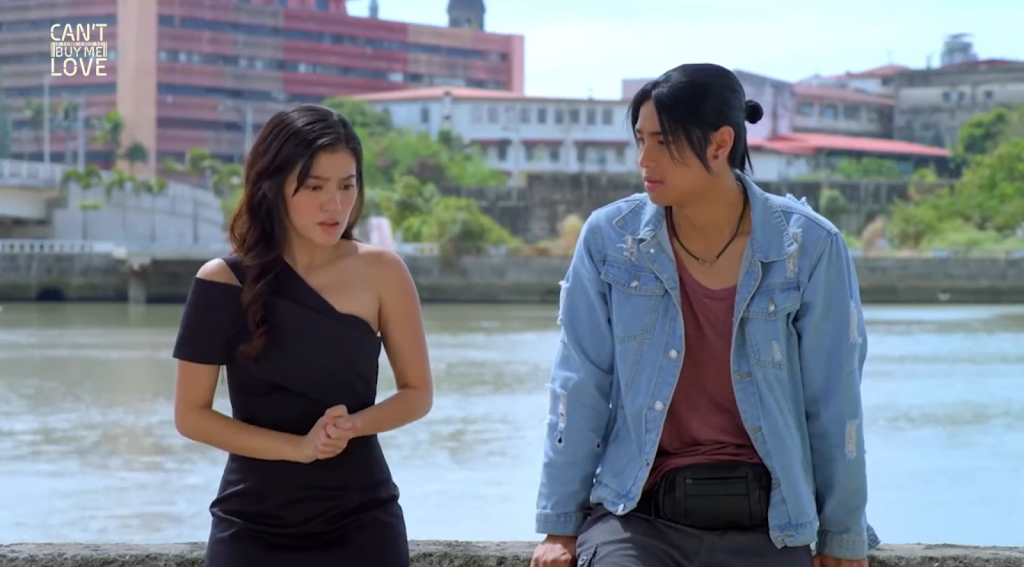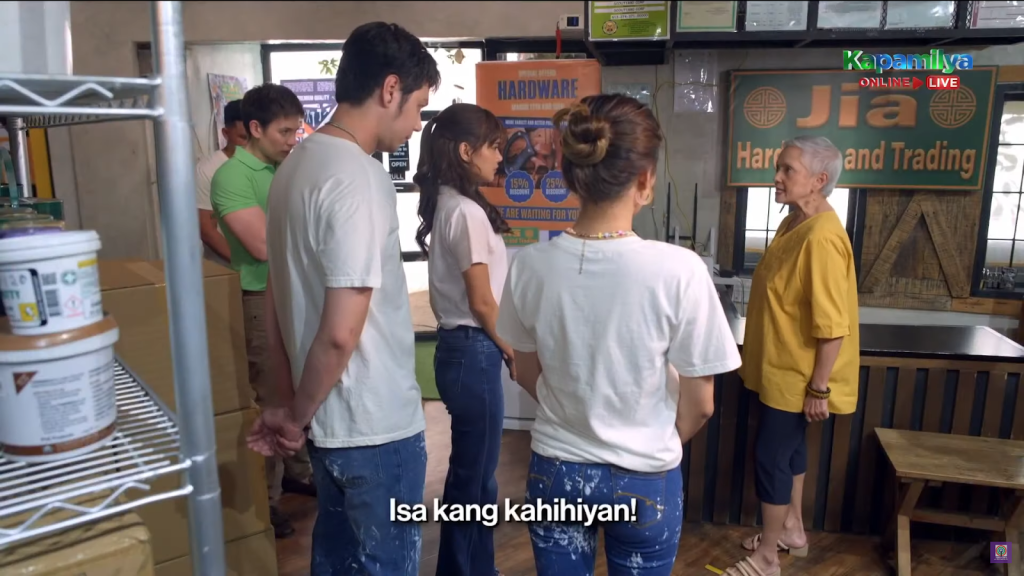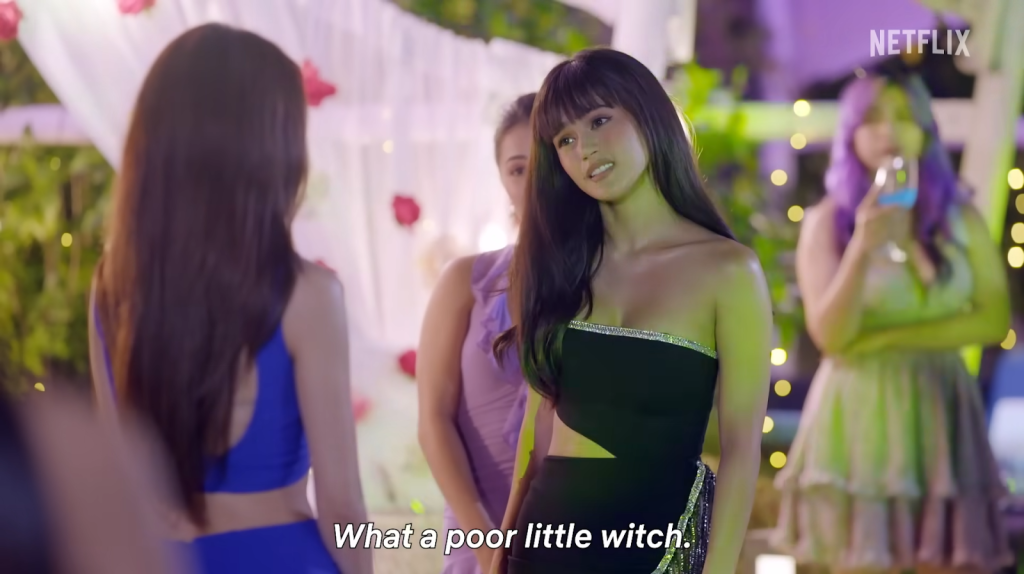5 Things That Chinoys Can Relate to From “Can’t Buy Me Love”

“Can’t Buy Me Love” serves more than just a captivating drama with lots of twists and turns; it’s a window into the intricate world of Chinoys and their culture, where traditions, values, and familial expectations intersect. Through its compelling storyline and relatable characters, the series has shown us love, ambition, and the struggle to balance personal desires with familial obligations.
We’ve compiled a few scenes that would definitely resonate with Chinoys out there!
The Great Wall

Photo courtesy of ABSCBN Entertainment YouTube, featuring Caroline and Bingo from Can’t Buy Me Love.
Although the more common trope between our two leading stars is the princess x pauper trope, we can see throughout the series how Ling’s family is cautious around Bingo and does not quite understand why Ling would go through lengths to spend time with Bingo when he was clearly from a different world from them (metaphorically, of course.)
In Chinoy culture, the term “Great Wall” refers metaphorically to the “invisible” barrier between Chinoy individuals and the broader Filipino society. This metaphorical wall represents the social, cultural, and economic distinctions that historically have separated the two communities.
Fortunately, in the series, we can expect more drama that’s being poured into the Tiu family affairs and the million dollar question “Who killed Divine?” rather than the “Great Wall” division. At this rate, not even the entire Great Wall of China can break the bond between Ling and Bingo.
The Duties of a Panganay

Being the panganay, or in this case the Ahya of the Tiu siblings, Wilson and Cindy hold high hopes for their firstborn to carry on the esteemed legacy of GLC. They envision their son assuming the mantle of CEO, entrusted with upholding the family’s values and steering the company toward continued success. However, with Charleston having his own business and not wanting to be part of the conglomerate at first, Bettina Tiu (Achi) was the one handling business affairs in her Ahya’s stead.
In Chinoy families, there’s often this unspoken expectation that the eldest child will seamlessly step into the role of continuing the family business. It’s almost as if they were born with the sole purpose of carrying on the legacy. While other family members may pitch in here and there, the spotlight usually shines brightest on the eldest, who’s expected to lead with a blend of tradition and innovation. The younger siblings may often find themselves navigating a different path, with less emphasis placed on them to carry on the business directly; there’s often more flexibility in their choices and pursuits. Hence, Irene’s vivid dream of opening her own bar and Ling’s “Mabenta Box” business venture with Bingo being mentioned a few times during the series.
Hiding One’s Dreams from One’s Parents

Photo courtesy of ABSCBN Entertainment YouTube, featuring Irene from Can’t Buy Me Love.
Most Chinoy children hide their dreams from their parents in fear of bringing disappointment when they are unable to reach their expectations or join in their family businesses. Irene, known for her eccentric, free-spirited behavior , was forced to share her plans of opening a bar to her parents after a kidnapping ordeal forced her hand. Despite her parents’ reservations—stemming from concerns about Irene’s maturity and the family’s prestigious image—she wanted to prove herself to her parents.
In her quest for independence, Irene navigated the complexities of familial expectations and personal aspirations, determined to forge her own path despite the obstacles. In the middle of the series, Irene and Ling had to prove themselves worthy in front of their father’s godmother Auntie Cathy, where the two sisters spent days working at Auntie Cathy’s restaurant Shi Wei Tian in Binondo.

Photo courtesy of ABSCBN Entertainment YouTube, featuring Auntie Cathy, Irene, Snoop, Dara, and Aldrich from Can’t Buy Me Love.
Despite her efforts, Irene’s attempts to impress Auntie Cathy repeatedly fell short, resulting in her dismissal. This left Irene disheartened, feeling she’d missed her chance to prove herself to her parents that she was more than capable of starting a business. But of course, Irene was still a Tiu afterall. Determined to pursue her dreams, she made a bold move: selling her shares in GLC to finance her own venture. Irene embarked on her entrepreneurial journey, ready to defy expectations and carve out her own success.
Arranged Marriages

Photo courtesy of Netflix Philippines YouTube, featuring Caroline and Stephen from Can’t Buy Me Love.
In the midst of the conflict between the Marianos and the Tius over the control of GLC, the Tiu family’s longtime friends and business associates, the Tanhuecos, stepped forward with a proposal. They offered to assist the Tius in reclaiming control of GLC. However, the Tanhuecos stipulated that for this plan to succeed, they required a marriage of convenience. Such a union would not only strengthen the partnership between their businesses but also foster closer ties between the two families.

Photo courtesy of Netflix Philippines YouTube, featuring Caroline from Can’t Buy Me Love.
In Chinoy culture, “kai shao” (介紹 kài-siāu) is a Hokkien word which means “to introduce” in English or “pagpapakilala” in Filipino. It involves parents or family members playing a pivotal role in selecting suitable partners for their children based on various criteria such as family background, social status, education, and compatibility. Oftentimes, “kai shao” becomes the first step to the road of marriage, at least that’s what the older generations believe it to be. However, in recent times, many modern Chinoy families have become increasingly receptive to allowing their children the freedom to choose their own partners in relationships.
The “I-si Hige Tsao Tsa Bo” Line
Of course, we can’t simply end this without mentioning one of the iconic lines of Miss Maris Racal as Irene Tiu. Perfectly explained by Mr. Thunderson Tan on Tiktok, “I-si Hige Tsao Tsa Bo” literally translates to “She’s a bad/stinky b*tch.”

Photo courtesy of Netflix Philippines YouTube, featuring Irene and Jersey from Can’t Buy Me Love.
While the literal translation may refer to a person being unpleasant, the term is often used to describe someone as disrespectful or lacking in manners. A lot of Chinoy may have heard the term “Tsao Tsa Bo”’ before during their youth or even ‘till this day. However, it’s important to note that “Tsao Tsa Bo” is a derogatory term so make sure to say it under your breath when no one can actually hear you!
Which Chinoy moment from “Can’t Buy Me Love” can you relate to? If you still haven’t watched “Can’t Buy Me Love”, you can catch it on Netflix!
